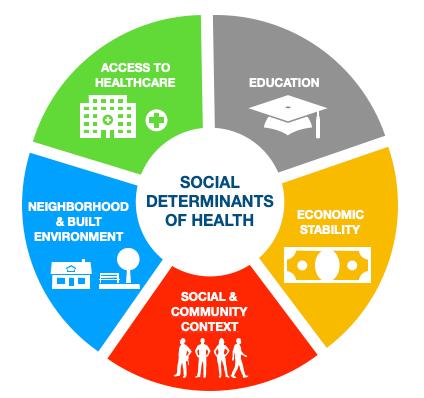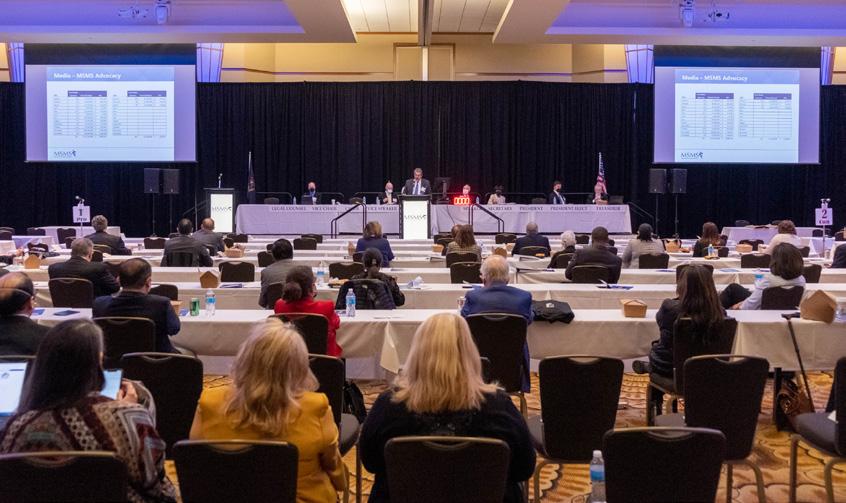
9 minute read
Hospital News
Henry Ford Macomb Hospital HENRY FORD HEALTH EARNS TOP RATINGS FROM HUMAN RIGHTS CAMPAIGN FOR LGBTQ+ HEALTHCARE, EQUITY
All Henry Ford Health hospitals earned a rating of 100 on the latest Human Rights Campaign Healthcare Equality Index
Advertisement
All five hospitals within Henry Ford Health have been recognized as an “LGBTQ+ Healthcare Equality Leader” by the Human Rights Campaign Foundation (HRC) in its 2022 Healthcare Equality Index, which is a tool that evaluates healthcare facilities on policies and practices dedicated to the equitable treatment and inclusion of their LGBTQ+ patients, visitors and employees. Henry Ford is one of only two healthcare organizations in Michigan recognized by HRC as an LGBTQ+ Healthcare Equality Leader. This is the third consecutive year all hospitals within Henry Ford have earned this designation. “As a healthcare organization committed to equity and inclusion, earning the highest rating from the Human Rights Campaign on its latest Healthcare Equality Index is inspiring and a true reflection of Henry Ford Health’s caring environment, driven by our compassionate team members,” says Kimberlydawn Wisdom, MD, Senior Vice President of Community Health & Equity and Chief Wellness & Diversity Officer at Henry Ford Health. “This honor recognizes our commitment to providing equitable and inclusive care and support for lesbian, gay, bisexual, transgender and questioning patients and employees, and ensures we are regularly assessing our success in driving inclusive policies and best practices by submitting our data for evaluation.” Now in its 15th year, the HRC’s Healthcare Equality Index continues to grow in the number of healthcare institutions that are embracing and adopting LGBTQ+ inclusive policies and practices. A record 906 healthcare facilities actively participated in the HEI 2022 survey. “Every person deserves to have access to quality healthcare, be respected and heard by their doctor, and feel safe in the facility where they are receiving care. But LGBTQ+ people are often subject to discrimination in all spaces, including healthcare facilities, which leads to members of the community avoiding care and anticipating our voices will not be respected in an incredibly vulnerable environment,” said Tari Hanneman, Director of Health & Aging at The Human Rights Campaign. “The Healthcare Equality Index, at its core, strives to ensure LGBTQ+ people are protected and affirmed by their healthcare providers and feel safe seeking services. Our HEI active participants are truly pioneering the healthcare industry by implementing robust, comprehensive LGBTQ+ inclusive policies that hopefully, because of their work, will become standard practice.” Inclusion on the list is based on participating healthcare facilities recognizing the importance of implementing LGBTQ+inclusive practices alongside their foundational non-discrimination policies. Henry Ford’s LGBTQ+-supportive policies are numerous and include: • A Henry Ford Health dedicated LGBTQ+ Health Resources web page. • A Henry Ford run clinic in the Ruth Ellis Center, which provides trauma-informed services for LGBTQ+ youth and young adults. • Hospital visitation policies that grant equal visitation to LGBTQ+ patients and their families. • Provider and employee training on LGBTQ+ patient centered care and unconscious bias. • Availability of all gender restrooms in all Henry Ford care facilities. • An Employee Resource Group (ERG) called PRIDE, which strengthens the organization’s workforce through recruit ment of talented LGBTQ+ employees. • Equal benefits for married LGBTQ+ team members and their same sex partner. • Support LGBTQ+ community events such as Pride Month and Happy National Coming Out Day activities. This year marks the fifth year that HEI participants were given a score based on how many LGBTQ+ inclusive policies and practices they have in place in four different criteria. The first criteria consist of the foundational elements of LGBTQ+ patientcentered care. The three remaining criteria are Patient Services and Support, Employee Benefits and Policies, and Patient and Community Engagement. In addition, participants must demonstrate that they offer transgender-inclusive healthcare benefits to their employees in order to receive the top score of 100 points and earn HRC’s LGBTQ+ Healthcare Equality Leader designation. This year, 496 participants earned this top designation. To learn more about LGBTQ+ resources for patients, visitors and employees, visit www.henryford.com/LGBTQ.
H O S P I T A L N E W S ALL FIVE HENRY FORD HEALTH HOSPITALS EARN HIGHEST QUALITY RECOGNITION FOR STROKE CARE FROM AMERICAN HEART ASSOCIATION AND AMERICAN STROKE ASSOCIATION

All five hospitals of Henry Ford Health, which are equipped to treat stroke, earned Get with the Guidelines® - Stroke Gold Plus and Target: Stroke Honor Roll Elite status for stroke care excellence from the American Heart Association and American Stroke Association.
This top-quality achievement recognizes Henry Ford’s commitment to ensuring patients with stroke receive the most appropriate and timely treatment according to nationally recognized, research-based guidelines grounded in the latest scientific evidence.
“This is the second consecutive year all of our hospitals have earned the Gold Plus designation, and the first time all of our hospitals at Henry Ford Health have earned Target: Stroke Honor Roll Elite status,” said Alex Chebl, MD, director of the Division of Vascular Neurology for Henry Ford Health and director of Henry Ford Hospital’s Comprehensive Stroke Center. “While stroke continues to be a leading cause of death and disability in the United States, the lasting effects of stroke can be significantly minimized when a patient is treated quickly and with evidence-based therapies. These quality recognitions from the American Heart Association and American Stroke Association are a testament to the consistency of care our patients receive when being treated for stroke at each one of our Henry Ford hospitals.” The Gold Plus award, which is what all Henry Ford Health hospitals earned, is an advanced level of recognition, acknowledging consistent compliance with quality measures embedded within the Patient Management Tool. These measures include evaluation of the proper use of medications and other stroke treatments aligned with evidence-based guidelines to improve outcomes for those who experience stroke. The Target: Stroke Honor Roll Elite designation signifies that the hospitals achieved arrival to thrombolytic therapy times within 60 minutes for 85% or more of eligible acute ischemic stroke patients. IV tPA is a “clot busting” drug that helps break up the blood clot causing a disruption of blood flow to the brain. All five Henry Ford hospitals were also recognized with Target: Type 2 Diabetes Honor Roll, which recognizes their commitment to ensuring patients with Type 2 diabetes receive the most up-to-date, evidence-based care when hospitalized with a stroke. According to the American Heart Association/American Stroke Association, stroke is the No. 5 cause of death and the leading cause of adult disability in the United States. On average, someone in the U.S. suffers a stroke every 40 seconds and nearly 795,000 people suffer a new or recurrent stroke each year. To learn more or request an appointment with a Henry Ford stroke specialist, please visit www.henryford.com/stroke.
McLaren Macomb Hospital
MCLAREN HEALTH CARE EXPANDS STROKE NETWORK THROUGH ADDITION OF AI TECHNOLOGY
McLaren Health Care expanded its statewide McLaren Stroke Network through the addition of leading-edge technology that results in quicker, time-critical treatment decisions for stroke care. RapidAI applies artificial intelligence to advanced imaging to analyze clinical data, expedite clinical decisions and connect the care team on a single, FDA-approved and HIPAA-compliant platform. Already the largest stroke program in the state, the addition of this AI technology adds to the program’s care capabilities, which has already garnered recognition from the American Heart Association/American Stroke Association and The Joint Commission.
“Time is critical during a stroke, and the sooner we, the physicians, receive the information we need to make a thorough diagnosis, the sooner we can activate a care plan and increase the patients’ chances of achieving an enhanced clinical outcome,” said Aniel Majjhoo, MD, interventional neurologist and neurosciences medical director at McLaren Health Care. “Adding this platform is a significant advancement to our program — one with the capacity to save our patients from the potentially devastating effects of stroke.” The technology is capable of recommending which stroke patients should undergo a thrombectomy, the procedure in which the interventional neurologist tunnels a catheter from the groin to the brain in order to remove the stroke-causing clot restricting blood flow in the brain.

H O S P I T A L N E W S
With the technology’s capabilities validated by several major clinical trials, adding the platform improves the McLaren Stroke Network’s clinical decision time and time to patient treatment, metrics that already best national benchmarks. All Michigan-based McLaren hospitals are part of the system’s Stroke Network. Through its use of telemedicine technology, every suspected stroke patient is evaluated by an interventional neurologist with extensive experience in the diagnosis and treatment of stroke — the only program of its kind in the state — aiding in the development and execution of a potentially lifesaving care plan. Stroke is the fifth leading cause of death and the leading cause of adult disability in the United States. With hypertension, a main risk factor for stroke, on the rise the risk for stroke is increasing. Learn more about the recognitions and capabilities of the McLaren Stroke Network, and how to spot the signs of stroke in yourself or a loved one, at www.mclaren.org/stroke.

The first and only Macomb County-based facility of its type, McLaren Macomb Senior Behavioral Health Center in Shelby Township recently admitted its milestone 100th patient. Opened in September 2021, the 100th patient was admitted on April 27, 2022. “Launching in the midst of the pandemic, nationwide staffing challenges and encountering a few obstacles along the way, reaching 100 patients this quickly really demonstrates the need for behavioral health care in the county,” said Theresa Chapman, director of the McLaren Macomb Senior Behavioral Health Center. “We would not have achieved this without the dedication and compassion displayed by our whole team.”

The new 23-bed inpatient facility is designed to meet the needs of adults 65 and older who are in need of treatment for increased anxiety, prolonged emotional issues after a major life event, behavioral disturbances, depression with suicidal thoughts, hallucinations and delusional thoughts, among other behavioral health needs.
Learn more about the McLaren Macomb Senior Behavioral Health Center at www.mclaren.org/macombgeropsych.
MCLAREN MACOMB CARDIOLOGISTS PERFORM 100TH WATCHMAN PROCEDURE
On April 20, 2022, a team of McLaren Macomb cardiologists, nurses and techs successfully completed the department’s 100th Watchman procedure in the Mat Gaberty Heart Center’s cardiac cath lab, becoming the first hospital in Macomb County to achieve the milestone. A potentially lifesaving, stroke prevention implant, the Watchman device closes off the left atrial appendage, a small, nonvital opening in the heart’s left atrium muscle wall. For patients with non-valvular atrial fibrillation, blood can pool in this appendage, increasing the likelihood of clots forming and traveling through the blood stream to the brain. Led by cardiac electrophysiologist M. Cameron Willoughby, DO McLaren Macomb performed the county’s first Watchman procedure in February 2020. Additionally, the McLaren Macomb Watchman team includes cardiologists Sibin Zacharias, MD; Jay Mohan, DO; Mark Zainea, MD; Melissa Ianitelli, DO and coordinator Andrew Jablonowski, NP.
Patients with atrial fibrillation live with a greater risk for stroke. The non-valvular form of atrial fibrillation is caused by conditions such as high blood pressure or an overactive thyroid rather than a faulty heart valve. Blood thinning medications help prevent the formations of blood clots in patients’ bloodstreams, but this procedure can free them from long-term anticoagulant therapies. Atrial fibrillation, affecting more than five million people in the United States, is the most common cardiac arrhythmia, with 20 percent of all strokes occurring in patients with atrial fibrillation. F









